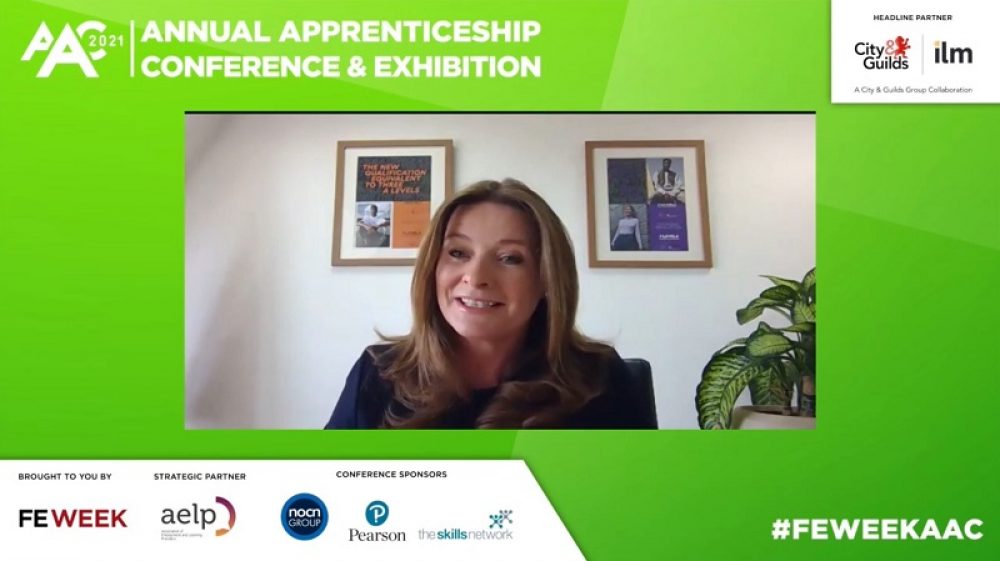The skills minister has ordered an investigation into the “astonishingly” high drop-out rate for apprenticeship standards.
Official government data published in March showed that just 60.2 per cent of apprentices training on new-style standards stayed on their programme until the end in 2019/20. This figure sat at 48.3 per cent the year before.
The retention rate on the old-style frameworks has stayed consistent at 69 per cent.
Minister Gillian Keegan was quizzed on the numbers this morning by FE Week editor Nick Linford on the first day of the Annual Apprenticeship Conference, and revealed she has asked the Department for Education to “look into this” after being left “astonished”.
She pledged that she “won’t stop” until the completion rate is “much, much higher”.
Keegan said she “couldn’t understand” why this is happening as apprenticeships were seen as the “golden ticket” when she left school and the “last thing you would dream of is not finishing it”.
“Are people being put onto apprenticeships they don’t know they’re on? Are people not being given the right support to finish? Are people going onto apprenticeships and then deciding it is not for them and then giving up and starting some other pathway in life?”
Keegan admitted there could be a variety of reasons for low retention, but early indications point part of the reason towards new apprenticeships being disjointed.
She explained that apprentices will often drop out if they achieve a qualification that proves their professional competency much before they are due to sit their end-point assessment, such as nursing.
Keegan described this as creating an “artificial end-point” that “needs to be more logically placed as part of the apprenticeship”.
She explained: “I have a suspicion that we need to make sure that all of the parts of the apprenticeship work intuitively.
“I have seen some examples where qualifications or certification may be separate from the end-point assessment by quite a long way. That doesn’t make much sense, so we need to make sure that the apprenticeship doesn’t have the end-point a long time after either the individual or business thinks they are at the qualification level.”
Keegan said this problem first came to light at the start of the pandemic when she was asked to sign off a group of nurses that hadn’t finished their end-point assessment but had completed their nursing and midwifery accreditation and wanted to be on the frontline.
“When I looked into it actually, they had completed their nursing and midwifery accreditation but the end-point assessment was a completely separate thing and came a long time afterwards,” she told delegates.
“I said that makes no sense and they should be together. You know, when is a nurse a nurse? The Nursing and Midwifery Council accreditation is the most logical point so I couldn’t understand.
“It is kind of like an artificial end-point and it needs to be more logically part of the apprenticeship.”
The issue that Keegan describes is already being acted upon by the Institute for Apprenticeships and Technical Education. In October 2020, the quango announced plans to “simplify and strengthen” apprenticeships that have a “statutory regulator” and an “established professional competency test”.
It would mean that in situations where an apprentice has met a statutory regulator’s requirements to practice, this will be counted as that apprentice’s end-point assessment in the future.
Currently, just 28 standards out of a possible 500 that are approved for delivery could be impacted, most of which are in the healthcare sector.
Watch the Minister’s address to the AAC








In the gas industry EPA’s are a major problem. Many apprentices see no value in them as gateway provides their required qualification to work in the industry.
Retention, as a result is a serious issue.
After this period of lockdown(s) and EPAs being postponed by many months there has been a huge rise in the lack of confidence learner’s are now experiencing in preparing for the EPA after so long not being in the industry (especially hands on skills). Mental health problems and learners questioning whether they want to continue in chosen sectors due to the pandemic has also had an impact, with some choosing to change careers after this long period of furlough and hence reflection.
The thought of then doing an EPA after many months has just put them off and left.
Although the apprenticeship drop-out rate cannot be simply attributed to the pandemic, the challenges faced employers & providers over the past year have contributed to these figures.
It’s important to understand what’s going on in our sector but carrying out an investigation now will only confirm that the pandemic was an all round pants year for apprenticeships.
Wouldn’t it be sensible to wait and monitor the impact of any bounce back on apprenticeship recruitment, retention & achievement before carrying out an investigation?
They were told End Point Assessment was a pointless hurdle when professional standards/licences to practise were included as part of the apprenticeship. They were asked why, when regulatory and professional bodies were prepared to sign off apprentices and save everyone money, they had to have a one-size-fits-all system with the extra expense of EPA. As usual, they don’t listen to consultation responses that don’t fit the post-Govian Tory obsession that everything must have an end assessment and an extra exam that they control, rather than employers and industry bodies. The chickens are coming home to roost, but they’ve already plucked themselves and are oven ready.
Why would a gas apprentice want to go through an EPA when to get to that point he has to get through gateway. To do that he has to have completed a qualification to become registered with gas safe at that point already qualified to work on gas so why do an EPA. Ill thought out standards and process again. Don’t get started on the need for English or Maths FS to pass an apprenticeship. No wonder drop out is high.
There’s a huge lack of education from the employers side too – and ironically the learning providers themselves. I’m lucky enough to work for a national company within the L&D team so have a lot of involvement with apprenticeships. My partner was employed as an apprentice but was released as her contract’s ‘end date’ had surpassed. However the end date of her apprenticeship’s learning period hadn’t yet been. She was signed off by her employer to go through gateway and they gave her a 3 month notice to complete her EPA but as she was unable to within this time frame (the scheduling of which was completely out her control might I add, plus the added delays of lockdown 1.0) she was released from employment before even having the opportunity to sit her EPA.
There’s a huge lack of education from the employers side too – and ironically the learning providers themselves. I’m lucky enough to work for a national company within the L&D team so have a lot of involvement with apprenticeships. My partner wasn’t so lucky at her workplace. She was released from her employment as an apprentice as her contract’s ‘end date’ had surpassed. However the end date of her apprenticeship’s learning period hadn’t yet been. She was signed off by her employer to go through gateway and they gave her a 3 month notice to complete her EPA but as she was unable to within this time frame (the scheduling of which was completely out her control might I add, plus the added delays of lockdown 1.0) she was released from employment before even having the opportunity to sit her EPA.
Amazing isn’t it a poor design of Apprenticeship where the candidate gets the qualification they need to show competency so don’t need EPA or Maths and English that was deemed so extremely important that Apprenticeship providers get half the funding of AEB!!!! and then had to get people to sit level 2. However once you get your technical certificate, and find that Maths and English isn’t need by your employer -.
Your employer doesn’t need the EPA either actual needs working that extra day making money lets guess job done.
Half price national entitlement really what kind of message does that give- Or you’re young want paid a better wage get your training free , then told you will get your certificate of competence – leave Apprenticeship or wait 3 months whilst EPA get round to you.
Let think cost of living crisis you’re an Apprentices you can wait 3 months for EPA or go and get a job paying £100 perhaps £200 a month more or join Amazon get a £1000 start bonus – its a hard one.
Frameworks finished with the certificate based on continual assessment no other waiting three months to find you might fail barrier to progression and guess what if you failed you didn’t have to ask your employer to find money for a resit.